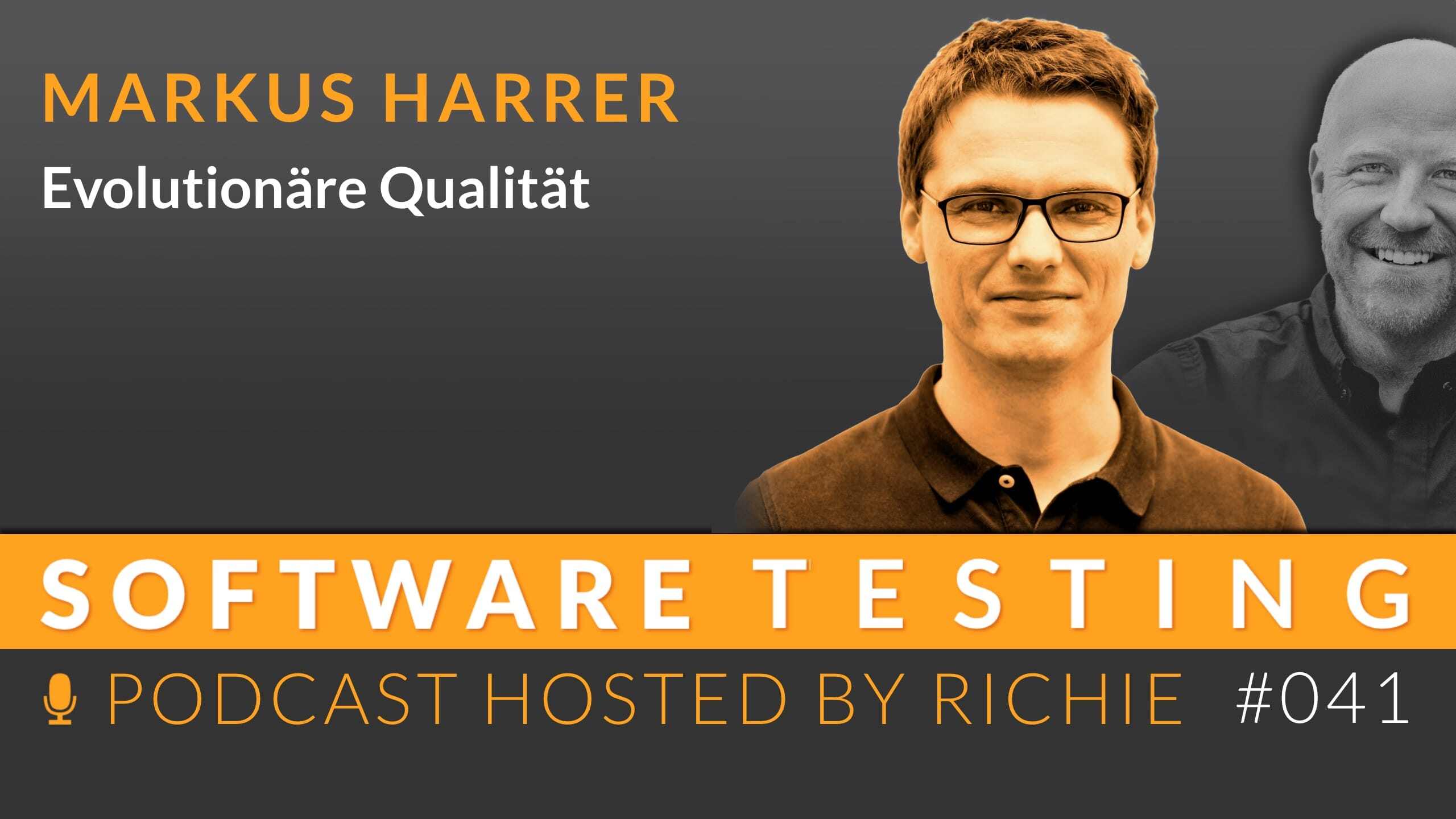Shift Left
Podcast Episode: Shift Left The idea behind Shift Left is to consider quality as early as possible in the development process. Because the later...

When thinking of software quality we have to see the importance of a quality-conscious mindset. In the rapidly changing technology landscape, especially with the influence of AI and agile practices, it is becoming imperative for professionals to integrate quality through all phases of software development. The traditional separation between developers and testers is giving way to a collaborative approach where all team members take responsibility for quality, but playing also their expertise. With the challenges that new developments bring, it is crucial to continuously challenge and evolve skills and mindsets to deliver robust and trustworthy software solutions.
In this first episode, I talk about the concept of “Quality as an Attitude”. I strongly believe that quality is critical in all our software development processes. Since the introduction of Agile 25 years ago, we must not only consider quality at the end of the process, but integrate it continuously. In times of AI and DevOps, it is becoming increasingly important to think how we work as testers and quality people. Quality is not just a task for testers, it affects everyone in the team. Let's work together for a better software future.
"The rise of AI in software development democratize creating software, but it raises questions about how to maintain quality." - Richard Seidl
Richard Seidl is a Software Testing Expert, Agile Quality Coach, and Podcast Host. Over the past 25 years, he has encountered a vast array of software throughout his professional journey: from the good to the bad, the large to the small, the new to the old. He's experienced software so magnificent it could bring one to tears, and others that make one cringe.Richie has helped teams and projects in various industries, such as administration, finance, automotive, and logistics, to improve their software quality, implement agile testing, and establish test automation.Richie is the author of several books on software testing, the host of a Software Testing podcast, and an international keynote speaker.
The world of software testing is always changing, pushing testers to adjust to new methods and technologies. In this article, we explore how the role of software testers has evolved over time and why having a quality mindset is crucial in today's software development process.
In the early days of software testing, developers often took on the role of testers due to the absence of formal test methods. This period marked a time when ensuring software quality was challenging and often overlooked.
Some key points to consider include:
As the software industry evolved, the need for dedicated testers and structured testing processes became apparent. The transition from developers as testers to specialized testing roles marked a significant shift in how software quality was approached and ensured.
In the early days of computing, developers often took on the role of testers due to the lack of formal test methods. However, with the advent of structured development methodologies like waterfall projects, there was a significant shift towards recognizing testing as a distinct and crucial profession in software development.
Waterfall projects emphasized sequential phases with testing typically occurring towards the end, highlighting the need for dedicated testers to ensure software quality throughout the process.
As software testing gained prominence, there was a growing demand for professional certifications for software testers. These certifications provided individuals with a standardized set of skills and knowledge, enhancing their credibility and expertise in the field.
By obtaining certifications, testers demonstrated their commitment to upholding industry standards and best practices, further professionalizing the role of software testing within organizations.
The rise of professional software testing marked a pivotal moment in the evolution of software development, emphasizing the importance of specialized skills and expertise in ensuring high-quality software products.
Agile transformation has changed the world of software testing, making it important for different team members to work together smoothly. This move towards agile methods has completely changed how testing roles work, moving away from old-fashioned isolated methods to a friendlier workplace. In agile teams, testers and developers collaborate closely, sharing duties and working together to ensure product quality.
Quality coaches have become important members of agile teams. They are responsible for creating a culture that prioritizes quality within the group. Their role goes beyond traditional testing responsibilities; it includes guiding team members on best practices, encouraging knowledge sharing, and promoting quality standards throughout all development stages. By connecting testers and developers, quality coaches play a crucial role in driving continuous improvement and nurturing a comprehensive approach to software quality.
In addition, personal development is essential in reinforcing the agile mindset within teams. By concentrating on individual values and personality growth, quality coaches can encourage better collaboration and ultimately lead to success in agile transformations.
The world of software testing has changed to include various specialized roles, addressing the increasing complexity and demands of quality assurance. Among these roles, the test automation engineer has become crucial. This role focuses on creating and executing automated test scripts that speed up the regression testing process, minimize manual work, and enhance test coverage. Automation engineers must combine strong technical skills—such as scripting, tool expertise, and integration with CI/CD pipelines—with an understanding of how automated tests contribute to overall quality objectives.
Alongside automation specialists, the role of the test manager has become more important. Test managers oversee the entire testing lifecycle within projects or organizations, coordinating between teams and ensuring alignment with business requirements. Their responsibilities go beyond managing test execution—they also drive strategy, resource allocation, risk assessment, and communication across stakeholders. A test manager’s skill set requires a balance between technical knowledge of testing processes and leadership abilities.
Diverse skill sets are essential in modern testing roles:
This combination empowers teams to deliver higher-quality software while adapting to shifting project needs and technologies. The increasing specialization within software testing highlights the importance of continuous learning and flexibility for professionals aiming to stay relevant in this dynamic field.
Artificial intelligence (AI) has revolutionized software testing by introducing AI-driven testing methodologies that automate repetitive tasks, such as regression testing and data generation. Here's how AI is transforming software testing practices:
AI-driven testing methodologies automate repetitive tasks, such as regression testing and data generation, freeing up testers to focus on more complex aspects of the software.
AI support tools assist testers in designing efficient test cases by analyzing historical data and identifying patterns that can be used to create targeted tests.
AI algorithms can analyze large sets of data to identify potential issues or areas of improvement in the software, allowing testers to proactively address them.
AI-powered tools can analyze existing test cases and recommend additional tests that should be performed to ensure comprehensive coverage of the software.
While AI has brought numerous benefits to software testing, there are also challenges associated with testing AI systems:
As artificial intelligence continues to evolve, its impact on software testing practices will likely grow even further. It is essential for testers and organizations to stay informed about these developments and adapt their strategies accordingly.
The concept of team quality mindset extends beyond the traditional role of testers. Every member involved in the software development lifecycle, including developers, UX designers, business analysts, and operations staff, must adopt quality as a shared responsibility. This collective approach helps embed quality into every phase, reducing defects and improving outcomes.
Challenges arise when quality is perceived solely as the tester’s job, leading to siloed efforts and missed opportunities for early defect detection. The Evolving Role of Software Testers reflects this shift: testers increasingly act as quality advocates or coaches who enable their peers to integrate quality practices into their daily workflows.
By breaking down traditional barriers and encouraging mutual accountability for quality, teams can create software products that meet functional expectations while also addressing non-functional aspects such as security and user experience. This integrated mindset supports faster feedback loops and continuous improvement within agile or hybrid project environments.
In today's dynamic software development landscape, the need to adapt testing practices to diverse project types and development models has become increasingly crucial. Hybrid projects, which blend traditional and agile methodologies, bring about unique challenges that demand tailored testing strategies to maintain quality throughout the process. By understanding the specific requirements of each project type, testers can effectively align their testing approaches to deliver high-quality software products.
Moreover, the implementation of continuous integration and delivery (CI/CD) pipelines plays a pivotal role in ensuring the seamless and efficient delivery of software. CI/CD practices enable teams to automate the build, test, and deployment processes, allowing for rapid iterations and real-time feedback on software quality. This iterative approach not only accelerates the development cycle but also enhances overall product reliability by identifying and addressing issues at an early stage. By integrating CI/CD practices into testing processes, teams can achieve greater agility and responsiveness in delivering top-notch software solutions.
Non-functional requirements have gained significant attention in recent software development projects, driven largely by regulatory demands and the complexity of modern applications. Areas such as security, usability, and compliance are no longer afterthoughts but integral parts of the quality equation. Organizations increasingly adopt approaches like security by design and usability by design, embedding these considerations from the earliest stages of development.
Security by design involves proactively integrating security measures into the architecture and development process instead of relying solely on end-of-cycle penetration testing or vulnerability scans.
Usability by design focuses on creating intuitive and accessible user experiences that meet diverse user needs while reducing friction and errors.
Addressing these non-functional aspects early helps to identify potential risks before they escalate into costly issues or regulatory violations. It also fosters a better user experience, which contributes to customer satisfaction and product success.
Testing teams now collaborate closely with architects, developers, UX designers, and compliance officers to ensure that these dimensions are continuously evaluated throughout the lifecycle. This multidisciplinary engagement encourages a holistic view of quality beyond functionality alone, recognizing that performance, security, accessibility, and legal adherence are equally critical components of software excellence. Such a perspective aligns with the philosophy of quality as an attitude, where optimizing projects with a focus on quality becomes the key to experiencing significant improvements.
Continuous learning and adapting to new technologies are crucial for software testers who want to improve their skills and stay relevant. As the role of software testers evolves, it's important to shift our mindset and embrace automation tools and AI for a sustainable career in this ever-changing industry.
By continuously learning and enhancing their skills, software testers can better prepare themselves for the changing world of quality assurance.
Quality is not just a phase in software development; it is an ongoing mindset that should be deeply ingrained at every stage of the process. As we have explored the evolving role of software testers, it becomes clear that embracing quality as a teamwide responsibility is essential for success in modern software development. It is crucial to foster a strong quality culture within teams and organizations to ensure the delivery of high-quality software products.
I encourage all readers to actively contribute to building a robust quality culture within their teams or organizations. By prioritizing quality at every level, we can collectively shape the future of software development and enhance the role of software testers in driving excellence.
Remember, quality is not just a task; it is an attitude that can transform how we build software for a better world.

Podcast Episode: Shift Left The idea behind Shift Left is to consider quality as early as possible in the development process. Because the later...

Podcast Episode: Evolutionary Quality Evolutionary quality refers to the adaptation of software qualities through different phases of evolution:...

Holistic testing moves beyond the traditional boundaries of software quality assurance by embedding testing activities throughout the entire software...